Mobilise, collaborate, invest. These were some of the words that characterised the debate promoted by INESC TEC during the 2023 edition of the Autumn Forum. The event brought together almost 300 participants to reflect on innovation ecosystems, and on the role of interface entities.
In the eighth edition of the Autumn Forum, INESC TEC challenged academia, industry, and public administration actors to discuss the role of interface entities in innovation ecosystems – especially at a time when the Recovery and Resilience Plan (PRR), in particular the mobilising agendas, is expressly relevant. The goal? To explore the development of these ecosystems, projecting the future from the current context, based on national and international cases.
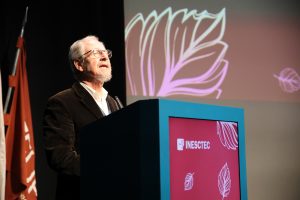
“The goal of the Autumn Forum – that we seek to hold every year – is to bring together a group of people, individually or institutionally, who can make a significant contribution to the discussion of relevant topics to the role of science, technology, and innovation in economic and social development”, said Pedro Guedes de Oliveira, Consultant to the INESC TEC Board of Directors and co-promoter (together with José Carlos Caldeira, Member of INESC TEC Board of Directors) of the event. “Our expectation is to improve our and other institutions’ knowledge through this type of outlooks, but also to influence and demonstrate that these discussions are vital to society”, he mentioned.
According to Pedro Guedes de Oliveira, the organising committee found it convenient to bring together the national entities part of the innovation ecosystem, to reflect on their development. “In 2023, and since we aim to overcome the so often mentioned ‘Death Valley’, we thought it would be adequate to call all entities involved in the innovation process to discuss how to develop it, focusing on the vital role played by interface institutions in this process”.
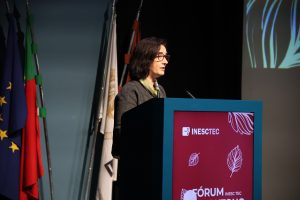
Elvira Fortunato, Minister of Science, Technology and Higher Education also attended the event. As part of the opening session, Elvira Fortunato took the opportunity to highlight how the PRR could boost the Portuguese economy, and its importance in terms of business innovation. “We are living in a period unlike any other; we have never had access to these amounts of funding. It is a unique opportunity, and we must work harder and harder”, she claimed.
José Manuel Mendonça, Chairman of the Board of Directors of INESC TEC, said that the science and technology system and the innovation ecosystem are now more important than we could ever perceive. “By debating them, we are debating our future”, he stated.
António Sousa Pereira, Rector of the University of Porto, and Rui Calçada, Dean of FEUP, also attended the event – which took place on November 21, at the Faculty of Engineering of the University of Porto (FEUP),
The innovation cycle and support programmes
This year, the event featured two guest speakers to address different innovation ecosystems: José Carlos Caldeira, Member of the Board of Directors of INESC TEC, with a brief presentation of the innovation cycle and its main activities – namely research, demonstration and development of pilots, market intervention, and valorisation of technology developed via research. However, there is a cross-sectional phase that has been less clear, concerning the dissemination of the work produced. “Most problems can be solved with existing technologies; it is only necessary to reuse or adapt them, without having to return to the initial research”, said José Carlos Caldeira. Moreover, it is important to remember that “this cycle must always be leveraged by education and training of all actors; otherwise, we will reach very good results, but miss the people who can apply them”, he explained. Rikardo Bueno, General Director of the Basque Research & Technology Alliance, began by presenting the example of the Basque Country – disclosing the strategic plan of the region to face the science and innovation challenges.
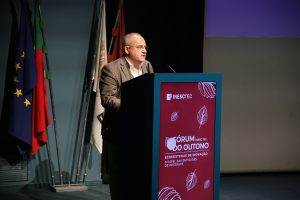
The second intervention, by Philippe Larrue (Directorate of Science, Technology and Innovation of the Organisation for Economic Cooperation and Development – OECD), focused on the structural evolution of research and technology institutions in the context of ecological and digital transformation worldwide.
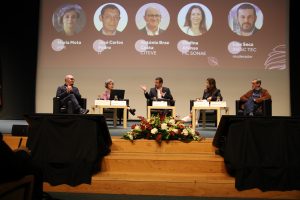
After the initial interventions, with national and international outlooks, the event featured two discussion panels. In the first, moderated by Luís Seca, Member of the Board of Directors of INESC TEC, the participants Maria Mota (Executive Director of iMM), José Carlos Pedro (President of IT), António Braz Costa (General Director of CITEVE) and Ondina Afonso (Director of Quality and Research at MC Sonae) discussed the role of interface entities, their positioning and their interrelationships.
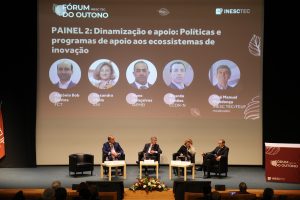
The second panel, led by José Manuel Mendonça, addressed the operating and financing models and the role of the State, featuring Alexandra Vilela (Executive Member of the Board of Directors of ANI), Nuno Gonçalves (Member of the Board of Directors of IAPMEI), Ricardo Simões (CCDR-N) and António Bob Santos (Member of the Board of Directors of FCT).
Overview and conclusion
Regarding the innovation area, there are clear and deep challenges that require new broader responses from innovation ecosystems and interface entities, in an integrated and collective manner. This is the main notion coming from the final session of the Autumn Forum, presented by João Claro, Vice-chairman of the Board of Directors and CEO of INESC TEC. “The new challenges force interface institutions to take important steps, change and evolve to become more strategic and stronger in terms of planning and priorities; to be more transversal and cover different dimensions, in a more systemic way – according to a sense of connecting to other entities and the ecosystem itself”, he said, stressing that “the transformation has to start now, so we can better anticipate the future”.
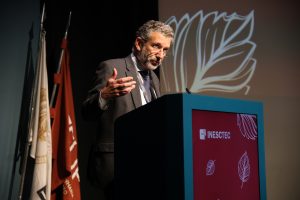
João Claro also took the opportunity to summarise the “four secrets to success in terms of public policies”, following the example presented by Rikardo Bueno about the Basque Country, perceived as vital to this ecosystem: sustainable policies, basic financing, technology transfer and cooperation networks. “We must leverage all this with a vision and a mobilising strategy to address economic benefits, competitiveness issues, innovation performance and everything that comes from it, but other dimensions beyond them”, he mentioned. “What mobilises us in terms of innovation, on a larger scale, is to solve important problems, faster; and we must explore the potential of our people”, concluded the CEO of INESC TEC.
João Claro also said that the next issue of INESC TEC Science & Society magazine will explore this theme and the contents will meet the interventions and discussions that took place throughout the day. INESC TEC Science & Society is a biannual publication, edited by INESC TEC; each edition addresses a special theme, without excluding articles on other topics relevant to society, towards disseminating science and contributing to the debate on the policies influenced by technology.
The researchers mentioned in this news piece are associated with INESC TEC and UP-FEUP.

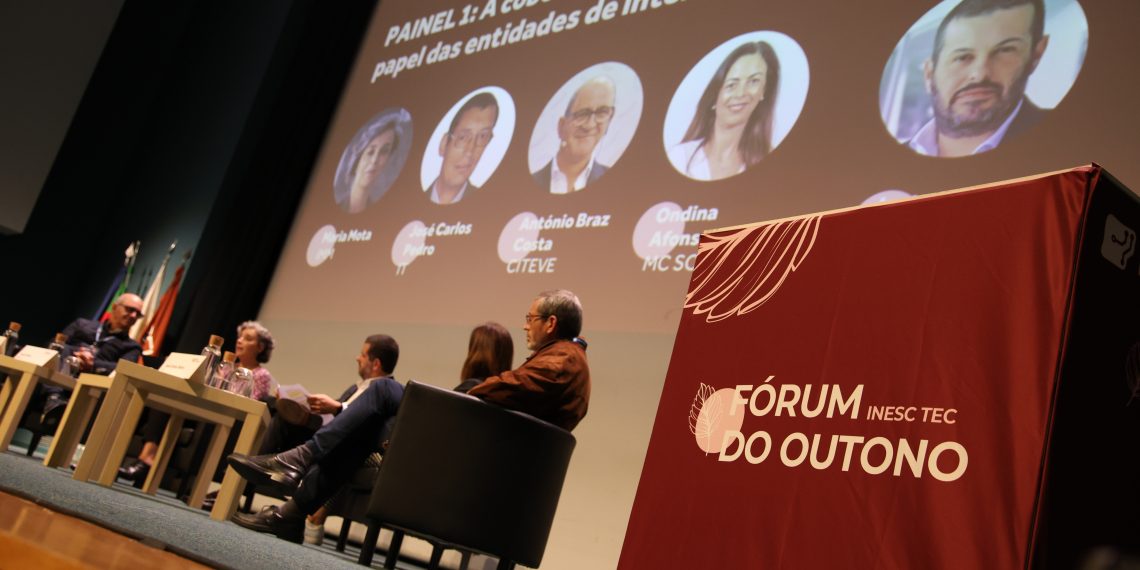

 News, current topics, curiosities and so much more about INESC TEC and its community!
News, current topics, curiosities and so much more about INESC TEC and its community!